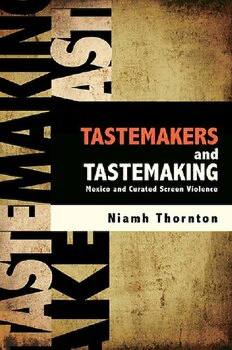
Tastemakers and Tastemaking: Mexico and Curated Screen Violence PDF
Preview Tastemakers and Tastemaking: Mexico and Curated Screen Violence
TASTEMAKERS and TASTEMAKING SUNY series in Latin American Cinema —————— Ignacio M. Sánchez Prado and Leslie L. Marsh, editors TASTEMAKERS and TASTEMAKING Mexico and Curated Screen Violence Niamh Thornton Published by State University of New York Press, Albany © 2020 State University of New York All rights reserved Printed in the United States of America No part of this book may be used or reproduced in any manner whatsoever without written permission. No part of this book may be stored in a retrieval system or transmitted in any form or by any means including electronic, electrostatic, magnetic tape, mechanical, photocopying, recording, or otherwise without the prior permission in writing of the publisher. For information, contact State University of New York Press, Albany, NY www.sunypress.edu Library of Congress Cataloging-in-Publication Data Names: Thornton, Niamh, 1972– author. Title: Tastemakers and tastemaking : Mexico and curated screen violence / Niamh Thornton. Description: Albany : State University of New York, 2020. | Series: SUNY series in Latin American cinema | Includes bibliographical references and index. | Identifiers: LCCN 2020023295 (print) | LCCN 2020023296 (ebook) | ISBN 9781438481135 (hardcover) | ISBN 9781438481142 (ebook) Subjects: LCSH: Motion pictures—Mexico—History and criticism. | Motion pictures—Aesthetics. | Television—Aesthetics. | Curatorship—Philosophy. | Television programs—Mexico—History. | Violence in motion pictures. | Violence on television. Classification: LCC PN1993.5.M4 T463 2020 (print) | LCC PN1993.5.M4 (ebook) | DDC 791.430972—dc25 LC record available at https://lccn.loc.gov/2020023295 LC ebook record available at https://lccn.loc.gov/2020023296 10 9 8 7 6 5 4 3 2 1 Contents List of Illustrations vii Acknowledgments ix Introduction Tastemakers and Tastemaking: Questions of Taste, Violence, and Gender 1 Chapter One Cultural Institutions and Gendered Taste Formation: Nelson Carro and the Cineteca Nacional in 2010 27 Chapter Two Commonplace and Routine: Amat Escalante’s Extreme Realism in Los bastardos (2008) and Heli (2013) 59 Chapter Three Reversioning and Thick Contexts: The Cinematic Adaptations of Los de abajo 87 Chapter Four Bodily Excess and Containment: Bordertown (Gregory Nava, 2006) and The Virgin of Juarez (Kevin James Dobson, 2006) 115 Chapter Five Curating Cruelty and Criminality: The Radical Mediation of Kate del Castillo 149 vi Contents Conclusion Ethical Reflections on Legitimation and Taste 183 Filmography 193 References 199 Index 217 Illustrations Figure 1 Slow cinema inspired by James Benning in Los bastardos 63 Figure 2 Opening credits (1939, left, and 1976, right) 98 Figure 3 The wife (1939, left, and 1976, right) 101 Figure 4 Macías in death (1939, left, and 1976, right) 108 Figure 5 Macías’s wife after his death (1939, left) and Macías in death (1976, right) 109 Figure 6 Lauren/Lopez as reporter 131 Figure 7 Lauren/Lopez as worker 132 Figure 8 Teresa/del Castillo finding her way 166 vii Acknowledgments To get from concept to manuscript takes much energy, time, thinking, and most of all support, encouragement, and nurturing. This is done with the help of many individuals too numerous to mention. These include colleagues and peers, friends and families. I am indebted to them all, but am responsible for the final version. Thank you to the University of Liverpool for giving me research leave in 2011 to carry out interviews and research in Mexico City and for the award of a Santander Grant in 2015 to complete my research in Mexico. To the staff at the libraries at the University of Liverpool for their support in sourcing material and those at Liverpool John Moores University at IM Marsh for the space to complete the writing and editing. Thank you to Ana García Bergua for her support and sharing her contacts with me so that I could interview individuals who otherwise were unavailable. Thank you to Nelson Carro of Cineteca Nacional de México in Mexico City for being generous with his time, insights, and expertise. To Elides Pérez Bistrain, Genoveva García Rojas, and the rest of the staff at the Centro de documentación at the Cineteca Nacional de México in Mexico City for finding what I needed and directing me to materials that only the archivists know connect to each other. As a work in progress over years of thinking, presenting, writing, and conversations this has been the product of many conference papers, blog posts, and the insights and questions of others. Sometimes they’ve been the result of me trying out my ideas in the world and realizing where they don’t always make sense to others. I appreciated all of those responses because they helped make this better. Thanks to those who have read and given considered feedback on drafts including Victoria McCollum. Any mistakes are mine, but the feedback has made it better. Thank you to the ix
